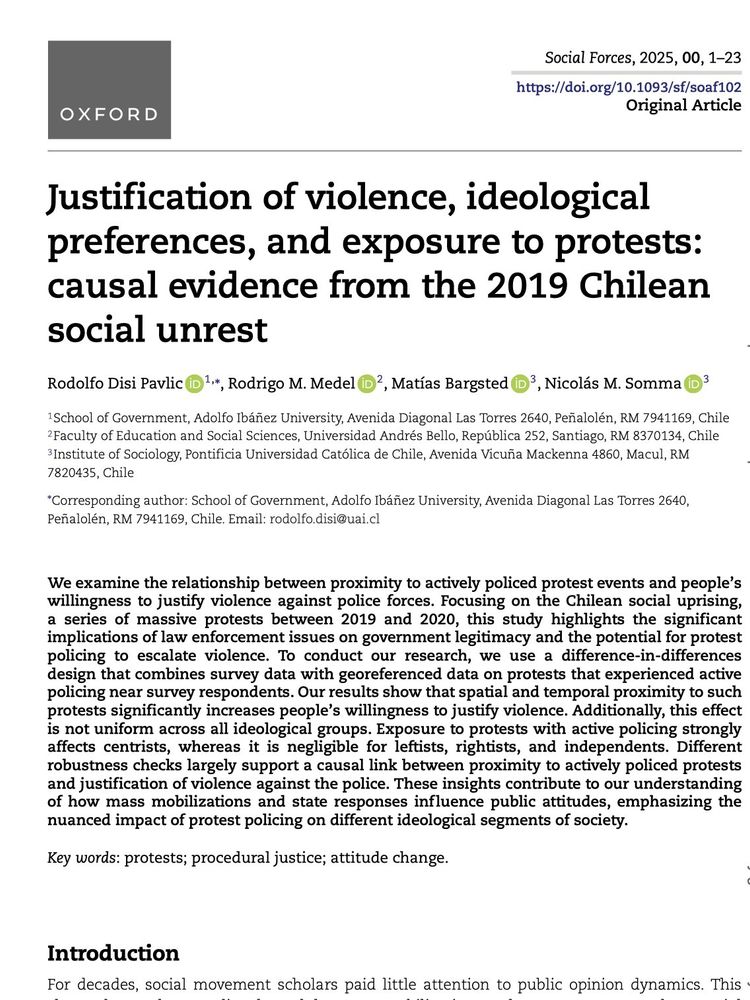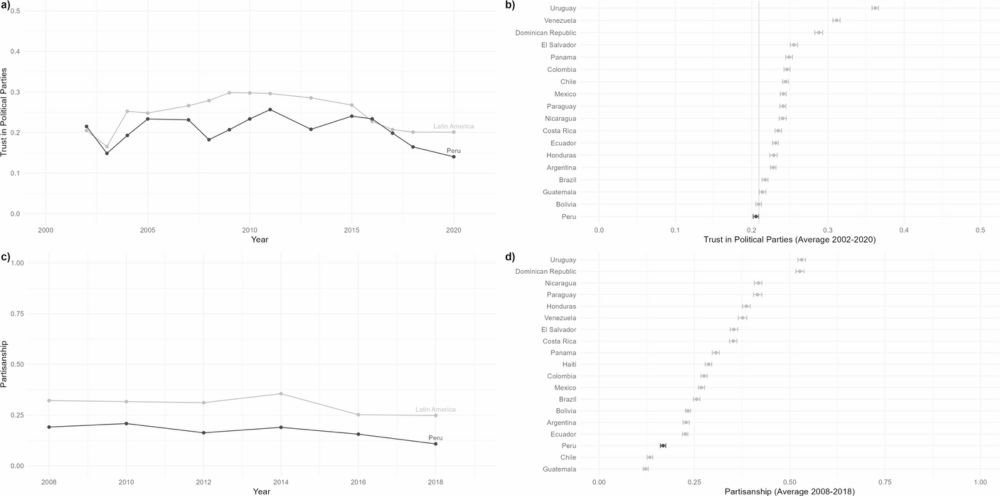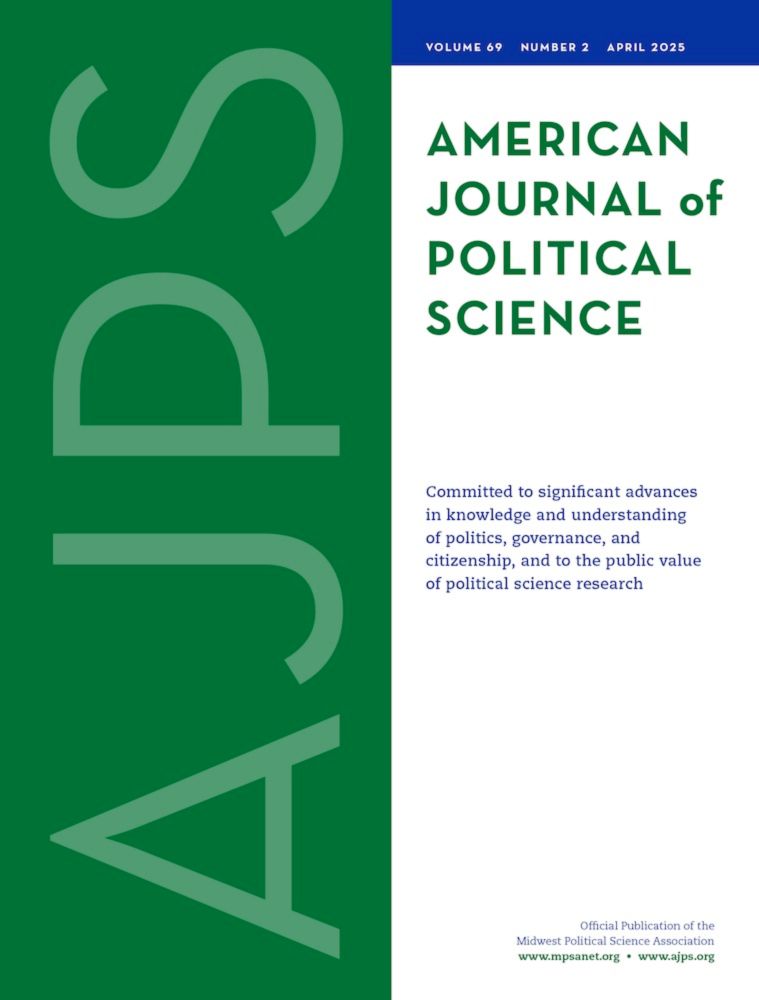Every so often reminded measurement in social science takes a back seat to hypothesis testing which isn't great for knowledge accumulation.
More folks should read:
eiko-fried.com/wp-content/u...
We also use agree-disagree scales too much (myself included)
13.10.2025 21:59 —
👍 11
🔁 4
💬 1
📌 1
@dpzollinger.bsky.social and I are thrilled "Cleavage Politics in Western Democracies" is out as an SI at @wepsocial.bsky.social!
Its papers explore the foundations of the cleavage pitting new left against radical right parties, and how it compares to the classic cleavages of Lipset & Rokkan:
🧵⬇️
07.10.2025 11:27 —
👍 118
🔁 57
💬 4
📌 8
🌟 Latin Americanist Meetups (LAM) at #APSA2025!
📍 Malone’s, 608 W Pender St, Vancouver
🗓️ Fri, Sept 12 @ 6PM — 16-min walk from Convention Centre
✨ Drop-in, no RSVP, pay your way
✨ Come & go freely
Questions? Ask @ndelacerda.bsky.social 🍻 #LAM #Vancouver
10.09.2025 16:23 —
👍 3
🔁 2
💬 0
📌 0
OSF
🚨🚨 NEW PRE-PRINT 🚨🚨
Prominent theories in political psychology argue that threat causes increases in conservatism. Early experimental work supported this idea, but many of these studies were (severely) underpowered, and examined only a few threats and ideological DVs. 1/n osf.io/preprints/ps...
20.05.2025 22:47 —
👍 61
🔁 22
💬 2
📌 1
LAPIS los invita a enviar propuestas para paneles patrocinados sobre instituciones políticas para LASA 2026. Postulece antes del 8 de agosto a través de este formulario: forms.gle/EhLLj5fkdWba.... Los paneles seleccionados tendrán aceptación garantizada en la conferencia.
22.07.2025 00:15 —
👍 2
🔁 2
💬 1
📌 4
Thanks, Rodolfo! Definitely, we have a working paper with @rcastrocornejo.bsky.social on how clientelism can engender positive affects. Paula Muñoz has a great book on clientelism as signals.
10.07.2025 15:48 —
👍 2
🔁 0
💬 0
📌 0

1/11 How does justification of violence against the police change when you live near protests that are actively policed?
In this article, just published in @sfjournal.bsky.social, we address this question using the 2019 Chilean social uprising as a case study.
doi.org/10.1093/sf/s...
10.07.2025 01:46 —
👍 32
🔁 14
💬 1
📌 3
For scholars of comparative politics, this highlights the need to study opinion formation in diverse institutional contexts beyond established democracies. 🧵/END.
26.06.2025 19:34 —
👍 1
🔁 0
💬 0
📌 0
This research shows partisan categories aren't always central to political reasoning. When parties aren't reliable information sources, citizens find alternative ways to organize their political environment.
26.06.2025 19:34 —
👍 1
🔁 1
💬 1
📌 0

2) Affective Polarization Patterns: In Peru, outgroup animosity substantially outweighs ingroup favoritism across multiple measures. Citizens are more motivated to oppose the "other side" than support their own.
26.06.2025 19:34 —
👍 1
🔁 0
💬 1
📌 0

Why this asymmetry? Two potential explanations:
1) Low Political Trust: When citizens receive political cues, they face conflicting signals, a shared identity (Fujimorismo/anti-Fujimorismo) from a distrusted source (politicians). This creates cross-pressure that weakens ingroup effects.
26.06.2025 19:34 —
👍 1
🔁 0
💬 1
📌 0
But here's the twist: only outgroup cues matter. Exposure to opposing group cues decreases support, but ingroup cues have no positive effect.
This asymmetry challenges core assumptions of the Social Identity Perspective, which emphasizes ingroup favoritism over outgroup hostility.
26.06.2025 19:34 —
👍 1
🔁 0
💬 1
📌 0

I conducted a survey experiment with 1,546 Peruvians, randomly exposing them to Fujimorista or anti-Fujimorista cues attached to real policy proposals currently discussed in Congress. Results show that political cues significantly influence policy preferences even without strong partisan brands.
26.06.2025 19:34 —
👍 1
🔁 0
💬 1
📌 0

Yet despite these harsh conditions for partisan attachments, Peru has two enduring non-partisan political identities: Fujimorismo and anti-Fujimorismo. These are defined not by party loyalty, but by opposing stances on the country's authoritarian past under Alberto Fujimori.
26.06.2025 19:34 —
👍 1
🔁 0
💬 1
📌 0

I test this argument in Peru, an extreme case of party system breakdown. Between 2015 and 2024, Peru had seven presidents, averaging just 1.1 years per president.
26.06.2025 19:34 —
👍 1
🔁 0
💬 1
📌 0
I argue that in contexts where party labels do not provide meaningful information, citizens turn to alternative political markers. From this perspective, partisan cueing is just one instance of a broader process: ingroup and outgroup cueing.
26.06.2025 19:34 —
👍 1
🔁 0
💬 1
📌 0
We know citizens use partisan cues to understand policy positions. But what happens when political parties are weak, unstable, and deeply distrusted?
In these contexts, parties offer little heuristic value and have limited capacity to shape citizens' political beliefs.
26.06.2025 19:34 —
👍 1
🔁 0
💬 1
📌 0

Cueing Without Parties: Experimental Evidence from Peru - Political Behavior
Citizens infer policy information from partisan cues, yet their utility varies cross-nationally. In weakly institutionalized democracies with short-lived political parties and volatile party systems, ...
🚨 NEW RESEARCH ALERT 🚨
My latest article is now available at @polbehavior.bsky.social!
"Cueing Without Parties: Experimental Evidence from Peru" explores how citizens navigate politics in contexts without stable parties and deeply-rooted partisan predispositions.
📖 doi.org/10.1007/s111...
26.06.2025 19:34 —
👍 18
🔁 10
💬 2
📌 0

Is Accountability Polarizing?
Holding anti-democratic leaders accountable is often seen as a risky endeavor. But a recent study in Brazil complicates that assumption.
www.lawfaremedia.org/article/is-a... via @lawfaremedia.org @ndelacerda.bsky.social @isabellatingley.bsky.social Ayelén Vanegas
22.05.2025 13:20 —
👍 1
🔁 1
💬 0
📌 0
Check out our new article in @lawfaremedia.org - with @ndelacerda.bsky.social and Ayelén Vanegas - which covers our our working paper "Institutional Accountability and Support for Democracy: Evidence from a Natural Experiment". You can see the article below.
21.05.2025 16:07 —
👍 8
🔁 4
💬 1
📌 0
A bonus to being a member of the @chesdata.bsky.social team is being involved in *super* cool projects, like this one - led by @ndelacerda.bsky.social and just out in @thejop.bsky.social 👇
19.05.2025 15:24 —
👍 9
🔁 2
💬 0
📌 0
Check out this Lawfare article discussing our working paper on the effects of accountability measures on democratic attitudes in Brazil! You can read the full working paper @apsa-preprints.bsky.social here: tinyurl.com/4429dwu6
21.05.2025 13:49 —
👍 3
🔁 0
💬 0
📌 0

A global scale of economic left-right party positions: cross-national and cross-expert perceptions of party placements | The Journal of Politics: Vol 0, No ja
With much thanks to @ndelacerda.bsky.social & a great @chesdata.bsky.social team, we have a new JOP article (early access) comparing expert evaluations of party positions from Europe to Israel to North America to Australia. doi.org/10.1086/736578
19.05.2025 13:15 —
👍 23
🔁 7
💬 1
📌 3

Party brands, issue salience, and electoral volatility
Rates of vote switching and electoral volatility have risen across Europe. The degree of programmatic differentiation between parties is a crucial determinant of volatility. When parties take simil...
Really pleased to see "Party brands, issue salience, and electoral volatility" published at @jeppjournal.bsky.social .
I argue that if electoral volatility increases as parties become more similar, that logic applies to both positional and salience differences.
www.tandfonline.com/doi/full/10....
12.05.2025 20:58 —
👍 31
🔁 11
💬 0
📌 1
Thank you :)!
27.03.2025 22:00 —
👍 1
🔁 0
💬 0
📌 0
Thanks, Abby! Looking forward to seeing your new psych work!
27.03.2025 17:47 —
👍 1
🔁 0
💬 0
📌 0












